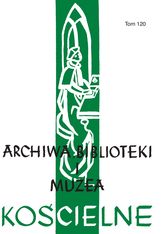THE DURAND COMPUTUS IN BOOK VIII RATIONALE DIVINORUM OFFICIORUM
THE DURAND COMPUTUS IN BOOK VIII RATIONALE DIVINORUM OFFICIORUM
Author(s): Natalia TurkiewiczSubject(s): Christian Theology and Religion, Archiving, Middle Ages, Methodology and research technology
Published by: Katolicki Uniwersytet Lubelski Jana Pawła II - Wydział Teologii
Keywords: Guillame Durand; medieval chronology; computus; Paschal reckoning; liturgical time;
Summary/Abstract: The main task of the study is to present the computational tools used by Durandus. The time of his scientific activity falls on the early period of computation development, and individual computists based their work on various elements of the computus, referring to Dionysius, Isidore of Seville, Bede the Venerable or Alexander of Villedieu (d. 1240). The aim of this study is also to analyse and diagnose the Durandus calculation algorithm and its originality in the computistic matter. Durandus’ study refers to the works of earlier commputists, and its originality lies in the selection of content. Some chronological issues are presented extensively (such as a 19-year cycle or months). Others, however, are only signalled in his work (such as the issue of concurrents or claves terminorum, which needed to be developed in the content of the article). The concise concept of the ecclesiastical computus contained in the Rationale divinorum officiorum refers in its content to the findings of the computists of the Roman calculation of Easter. His treatise, although setting out the rules of conduct in liturgical matters, strengthens and popularizes the Roman system of Paschal calculus adopted from its predecessors, and also defines the important element of the functioning of canon law.
Journal: Archiwa, Biblioteki i Muzea Kościelne
- Issue Year: 2023
- Issue No: 120
- Page Range: 489-508
- Page Count: 20
- Language: English

